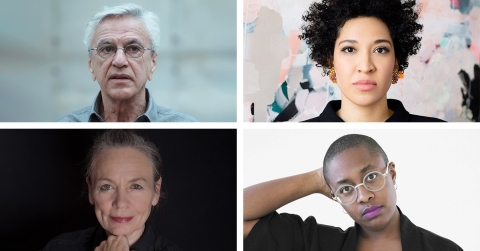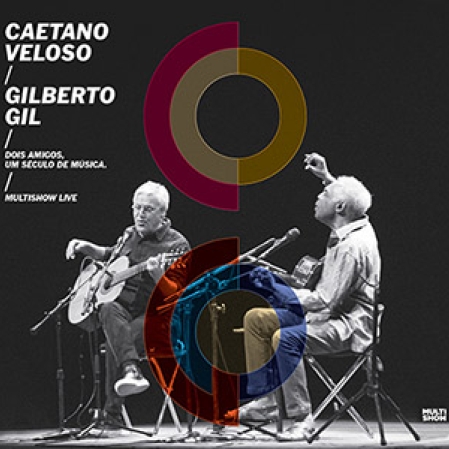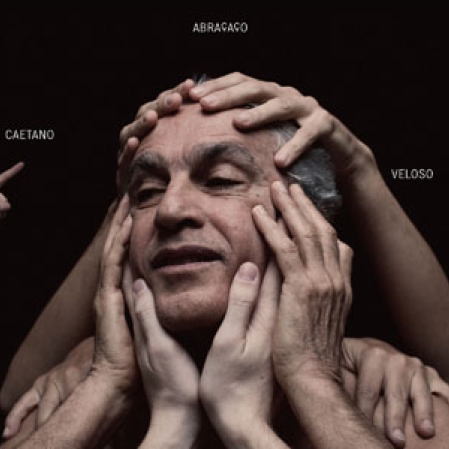On his first all-English set, Veloso pays tribute to 20th century American pop composers, from Cole Porter to Kurt Cobain. "His more outre or unconventional choices," says the Washington Post, "sit comfortably alongside such standards as 'Nature Boy' and 'Smoke Gets in Your Eyes.'"
Caetano Veloso is widely recognized as one of the world’s most original artists and has been hailed by The New York Times as “one of the greatest songwriters of the century.” Still Veloso never hesitates to acknowledge those who influence his own music—whether the bossa nova pioneer Joao Gilberto or the seminal filmmaker Federico Fellini. His first album sung entirely in English, A Foreign Sound reveals the diversity of American songwriters he has loved and studied over the years, from Irving Berlin, Rodgers and Hart, and Cole Porter to Stevie Wonder, Bob Dylan and David Byrne.
A Foreign Sound is a culmination of Veloso’s longstanding and multifarious exploration of American music. Surprising and imaginative interpretations of American songs have been a staple of his recent live shows, and they have made occasional appearances on his studio albums over the years. As he explains in his acclaimed memoir, Tropical Truth: A Story of Music & Revolution in Brazil (Knopf 2002), he came to some of his favorite American singers and musicians—including Billie Holiday, Ella Fitzgerald, Chet Baker, Miles Davis, and the Modern Jazz Quartet—by tracing the steps of his foremost musical hero, Joao Gilberto. On A Foreign Sound, Veloso interprets several songs he first learned listening to these artists in the early 1960s, including “So In Love,” “Love for Sale,” “Manhattan,” and “Body and Soul.” Other songs have particular significance in the context of Brazilian culture.
Veloso’s approach to the music varies from track to track. While on some songs he is backed by a 28-piece orchestra, on others his only accompaniment is his signature acoustic guitar playing. “Love for Sale” is recorded completely a cappella. Among the many accomplished musicians featured on the album are Caetano’s son Moreno and his longtime collaborator Jaques Morelenbaum, who contributes as arranger, conductor and cellist.
PRODUCTION CREDITS
A Universal Music Production
Produced by Caetano Veloso and Jaques Morelenbaum
Except track 19 (co-produced by Kassin and Berna Ceppas), track 4 (co-produced by Pedro Sá and Moreno Veloso) and track 11 (co-produced by Pedro Sá)
Artistic director: Max Pierre
Artistic manager: Ricardo Moreira
Executive supervisor: Conceição Lopes
Executive producer: Beth Araújo
Assistant: Bel Kurtz
Roadie: Pimpa
Orchestra contractor: Paschoal Perrota
English language advisor: Duncan Lindsay
Recorded and mixed at AR Estúdio, Rio de Janeiro by Marcelo Sabóia
Assisted by Fernando Fishgold and Bruno Stehling
Except track 19 (recorded at Estúdio Monoaural by Kassin and Berna Ceppas, assisted by Estevão Casé), “There Will Never Be Another You,” recorded at Estúdio Palco by Thiago Braga, assisted by Adriano Silva; and track 22 (percussion recorded at Estúdio Ilha dos Sapos by Flavio Souza, assisted by Cristiano Lacerda)
Track 16 contains a sample from “Te Entrega, Corisco” by Sérgio Ricardo (from the Deus e o Diabo na Terra do Sol soundtrack)
Tracks 2, 3, 5, 7-9, 14 and 17 conducted and arranged by Jaques Morelenbaum
Track 4 arranged by Pedro Sá and Moreno Veloso
Tracks 11 and 19 arranged by Pedro Sá
Track 19 arranged and programmed by Kassin and Berna Ceppas
Track 20 transcribed from the original recording by DNA and conducted by Jaques Morelenbaum
Track 22 arranged for percussion by Carlinhos Brown, arranged for strings and conducted by Jaques Morelenbaum
Mastered by Robert C. Ludwig at Gateway Mastering Studios, Portland, ME
Concept, graphic design, and photography by Miguel Rio Branco
Typography and graphic production by Zoy Anastassakis
Assistant to Miguel Rio Branco Mariana Mello
Graphic coordination Gê Alves Pinto and Geysa Adnet
Executive Producer: Robert Hurwitz
79823
This album is available from Nonesuch in the United States only.
MUSICIANS
Caetano Veloso, vocals (1-22), guitar (3), acoustic guitar (12, 14, 18, 21), steel string guitar (15)
Davi Moraes, electric guitar (1, 16), 10-string steel guitar (10), electric bass (1, 16), drums (1)
Marcio Victor, timbau, snare drums, torpedo, afoxé, bacurinha (1); timpani, caxixi, drum rim (10); finger snapping (14)
Jó, timbaus, snare drums, surdos virados (1); timpani, bass drums, drum rim (10); finger snapping (14)
Du, timbaus, snare drums, surdos virados (1); timpani, bass drums, caxixi (10); finger snapping (14)
André Junior, timbaus, snare drums, surdos virados (1); timpani, bass drums (10); finger snapping (14)
Lula Galvão, acoustic guitar (2, 7)
Zeca Assumpção, double bass (2, 7, 18)
Marcelo Costa, drums (2); tambour, surdo drum (9)
Jaques Morelenbaum, cello (2, 7, 13), finger snapping (14), celesta (17)
Violins (2, 3, 5, 7, 14, 17, 20): Bernardo Bessler, lead; Michel Bessler, Antonela Pareschi, Eduardo Hack, Paula Prates, Léo Ortiz, Mariana Sales, João Daltro, José Alves, Rogério Rosa, Walter Hack, Ricardo Amado, Paschoal Perrota, Carlos Mendes
Violas (2, 3, 5, 7, 14, 17, 20): Marie Springuel, Jesuina Passaroto, Eduardo Pereira and Ricardo Taboada
Cellos (2, 3, 5, 7, 14, 17, 20, 22): Marcus de Oliveira, Marcelo Sales and Hugo Pilger, Diana Lacerda, Fabio Presgrave, Ricardo Santoro, Alceu Reis, Marcio Mallard and Jorge Ranevsky
Yura Ranevski, cello (2, 3, 5, 7, 14, 17, 20), finger snapping (14)
Jorge Helder, double bass (2, 3, 5, 7, 9, 14, 17, 20)
Denner Campolina, double bass (2, 3, 5, 7, 14, 17, 20)
Moreno Veloso, cello, bass drum (4); acoustic guitar (10)
Pedro Sá, electric guitar (4, 11, 19), tambour (4), electric bass (10)
Carlos Bala, percussion (7, 14)
Carlos Malta, C-flute, alto flute, bass flute (7); alto sax (8)
Andréa Ernest Dias, alto flute (7)
Leo Gandelman, Miguel Gandelman, Zé Canuto, Dirceu Leite and Eduardo Morelenbaum, alto saxes; Marcelo Martins, Daniel Garcia, David Ganc, José Carlos Ramos, tenor saxes; Henrique Band, baritone sax (8)
Luiz Brasil, acoustic guitar (9)
Vitor Santos, trombones (9)
Dadi, steel-string acoustic guitar (10); acoustic steel guitars, electric guitar, music box, electric bass (12)
Orlando Costa, African caxixi, atabaque, bongos, tama, effects (12)
Leo Gandelman, alto (14)
Pupilo (of Nação Zumbi), drums (16)
DJ CIA, scratches (16)
Antônio Pinto, digital processing and editing of percussion (saxophone keys) (16)
Andréa Ernest Dias, flute (17)
Cristiano Siqueira Alves, Lucia Morelenbaum, clarinet (17)
Ismael de Oliveira, Francisco Soares, French horns (17)
Ricardo Silveira, electric guitar (18)
Stephane San Juan, afoxé (19)
Marcio Bahia, percussion (20)
Carlinhos Brown, cajón baixo, tincajón, balafon, Mary Cristo harp, symphonic bongo, ponteiros, claves, cyber effects, handmade electronics, marbles, brooms, trunk, wood block, egg shakers (22)



















